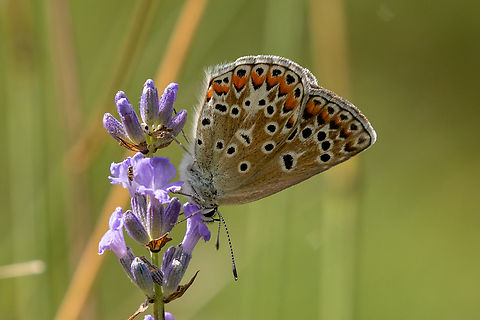
Appearance
L. "escheri" Hbn.. male and female above similar to "icarus", but much larger; the underside more prominently spotted, with more numerous ocelli, but the forewing beneath always without basal ocelli; the ground-colour of the underside in the male more shaded with grey and in the female sometimes darkened to a chocolate-brown; moreover, the discal row of ocelli of the hindwing is more proximal, standing nearer the discocellular spot than in "icarus". Southern Europe, from Spain to the Balkan Peninsula, northwards extending into the Alps. Females with the upperside strongly dusted with blue are ab. "subapennina" Tur. —"dalmatica" Spey. is the form from Dalmatia; the male is lighter blue, more similar in colour to "hylas" than to "icarus"; the black margin, which is very narrow in "escheri" is here broader, and the hindwing above bears very weak traces of dark spots at the margin. If these spots are especially distinct, we have ab. "punctulata" Wheel. — Egg of the usual flattened from, pure white, with small projections at the corners of the meshes of the minute network. Larva until April on "Astragalus" and "Plantago". The butterflies commence to fly at the end of June, occurring in mountain valleys, singly but not rarely; they have a rather clumsy
flight and frequent specially the beds of brooks. The length of the forewings is 17–19 mm.
Naming
*"P. e. escheri"⤷ "P. e. dalmatica" Balkans
⤷ "P. e. splendens" Apennines
⤷ "P. e. helenae" Charente-Inférieure, Dompierre-s-Mer
⤷ "P. e. roseonitens" Spain
⤷ "P. e. balestrei" Alpes Maritimes
⤷ "P. e. ahmar" Morocco
⤷ "P. e. parnassica" Greece
Behavior
The butterfly flies from May to August.The larvae feed on "Astragalus" species and possibly sainfoin.
References:
Some text fragments are auto parsed from Wikipedia.